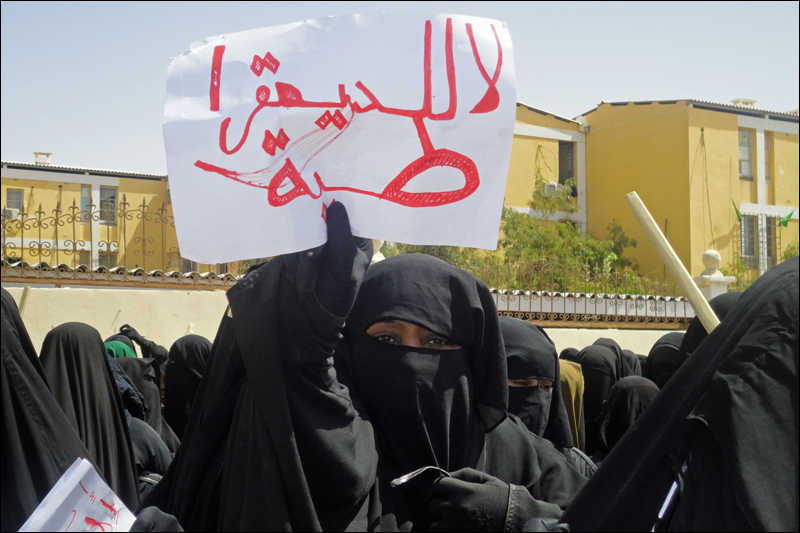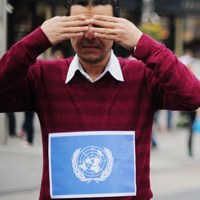![]()
Edited by Crethi Plethi

A Salafist protestor in Nouakchott holds up a sign reading, "No to democracy." (Raby Ould Idoumou/Magharebia)
Now the initial euphoria about the Arab revolts has subsided, it’s clear the ‘Arab Spring’ will not bring a liberal, secular, Western (or Islamic) model of democracy to the Arab world. Instead, the revolts have opened broad new political horizons for Salafist and Islamist parties in North Africa and the Middle East. This will eventually lead to the imposition of Islamic law and Islamist social and political traditions on the former varied Muslim societies.
The shift in the balance of power resulted in Islamist/Salafi landslide election victories: Islamist party Ennahda won the Tunisian elections; the Islamic Justice and Development Party won the Moroccan parliamentary elections; the Muslim Brotherhood and Salafist parties won the Egyptian parliamentary elections; powerful Islamist players emerged in Libya, Yemen and inside Syria’s opposition; Islamists are expected to top the upcoming election poll in Algeria; and the Islamist “Harakat Ansar al-Din (Movement of Religious Supporters) joined up with Touareg nationalists to conquer more than half of Mali in a matter of days.”
And all of them want to impose Sharia Law on the region.
According to an April 6, 2012 Magharebia article, the “Salafists are moving closer to changing the face of the Maghreb … Now it is Mauritania’s turn.” The article notes that the Salafi Nouakchott rally of March 29th, 2012 marked a major shift in the social and cultural dynamic. The rally was the first by Salafists since Mauritania’s independence in 1960.
Raby Ould Idoumou, a Nouakchott-based writer, terrorism analyst and communications director for the Mauritanian Human Rights Association (AMDH), wrote the following report:
This time, it was not students or civil society activists but scores of women in niqabs — including the wives of terrorists — carrying banners reading: “No to Democracy!”, “No to Secularism!” and “We want to apply Sharia!”
“Salafists want to take advantage of the situation after the Arab Spring,” notes Hamady Ould Dah, a terrorism analyst and specialist in strategic studies, … “The Salafists are benefiting from freedom of expression, … Meanwhile, they attack democracy and secularism … These calls for extremism must be condemned because if the Salafists make it to power, it will inevitably mean less freedom,” the analyst tells Magharebia.
According to journalist Mohammed Ould Sid al-Mokhtar, “The demonstration was the first political appearance of Salafists, but it won’t be the last.”
“I think that they are actually about to enter the field of politics,” he says. “The Salafists are looking for political gains, and the women’s demonstration was only to see how the street will receive them and how the government itself will react.”
Elders of the movement are reportedly pushing towards the creation of a political party, while most young Salafists continue to reject politics: “Leaders of the established current in the Mauritanian Salafist movement are strongly trying to attract young people to their side, which supports a political party,” the Essirage news website quoted an inside source as saying.

Female Salafists, shown rallying in Rabat, Morocco, in 2010, are emerging from the shadows to support sharia. On March 29th, Salafist women staged a protest in Nouakchott. (AFP/STR)
Tactics are the same as the Muslim brotherhood is using in Egypt to achieve their political objectives: present yourself as moderates, as Magharebia explains in the article:
Ahead of a possible entry into the political arena, Salafists are trying to consolidate their place in Mauritanian society. Salafist leader Ahmed Ould Heinna Ould Mawloud, for example, has spoken out against the violence embraced by al-Qaeda, despite being brother-in-law to Khadim Ould Semane, the leader of al-Qaeda’s Mauritanian branch Ansar Allah al-Mourabitoun.
His willingness to denounce al-Qaeda tactics shows that the current is looking for a foothold in politics, so as to apply Sharia to all aspects of political, economic and social life.
Maghreb observers such as Mauritanian professor Al Sayed Ould Abbah are voicing alarm over the trend.
“The Islamic movement has generally embraced the Salafist doctrinal system since the 1960s, a time when an active Salafist Brotherhood current appeared … We’re now witnessing the breaking of Islamic ground into highly different trends that can no longer be classified according to the common standards in the Islamic field,” Ould Abbah adds. “It’s clear that contradictions are widening between the new patterns of Salafism and the Islamic parties that are benefiting from democracy.”
Read Magharebia’s full report here.



 RSS
RSS










Latest Comments
Hello Mike, Thank you for your positive feedback to the article. I felt there wasn’t too much critical analysis of ...
Thanks for this considered and well constructed article. A follow up article on the manner in which the editorial contro...
THE CLUELESSNESS OF CLAIMING THAT OBAMA'S MIDDLE EAST POLICIES WERE A FAILURE CANNOT BE FURTHER FROM THE TRUTH, WHAT THE...
As long as Obama is the president of the usa do not trust the us government......
Thank you for an good read....